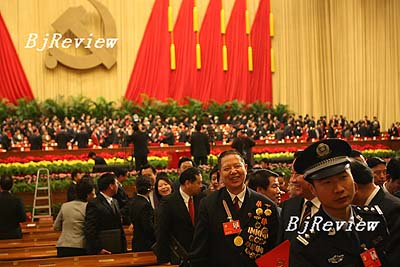|

At the just concluded 17th National Congress of the Communist Party of China (CPC), a great step has been taken toward democratic reform with the inclusion of a tenure system for delegates to CPC congresses at all levels in the Party's Constitution, .
The amendment, designed to empower delegates to supervise Party committees at all levels, was endorsed on October 21.
It enshrines the right of CPC cadres to elect, supervise, criticize and demand attention from the Party's leadership.
"The tenure system plays an active role in establishing the authority of the Party congress and activating the functions of both the Party congress and its delegates," commented Liang Yanhui, a professor from the CPC Central Committee's Party School, the Party's top cadre-training base and a leading thinktank.
More functional
In China, the National People's Congress is elected for a term of five years. During the term the People's Congress deputy carries out his statutory duties. The tenure is same as that of the Party congress deputy, but he has no duties between national Party congresses.
Major decisions at the local level are made at local Party plenums, which are held every few years. There have been few meetings between plenums and this has contributed to the poor functioning of the Party's deputy system. Many Party members, including a considerable number of Party deputies, see Party membership as simply a political honor.
According to Zhang Xiaoyan, political science expert from the CPC Central Committee's Party School, the newly adopted tenure system guarantees the right of Party deputies to elect, supervise and criticize the Party's leaders and organizations, to demand attention from the leadership of the Party congress and to recall inept Party cadres.
From theory to Constitution
The CPC has always respected and safeguarded the democratic rights of its members over the Party's 86-year-long history.
It has been working to establish a Party congress system with regular annual conferences to promote inner-Party democracy since the very first-generation of the Party leadership, said political expert Li Yongzhong.
Documents show that in 1956, Mao Zedong suggested adopting a five-year-term tenure system for the Party congress.
The second-generation Party leader Deng Xiaoping also proposed in a report on the amendment of the Party Constitution at the Eighth National Congress of the CPC that a system of Party congresses with regular annual conferences should be tried out at central, provincial and county levels.
Afterwards the 10-year "cultural revolution" (1966-76) wreaked devastation on the Party and the country. "The Party has drawn lessons from its turbulent history, and made collective leadership construction a shared notion among generations of Party leadership," noted Huang Weiting, Associate Chief Editor of Red Flag Press.
The third-generation Party leader Jiang Zemin also emphasized expanding inner-Party democracy and promoting supervision by ordinary Party members at an important Party plenum in June 1989.
"The rules of procedure in the central leadership have been systematized and standardized. Discussions are clearly distributed among different levels of Party meetings," noted Yu Yunyao, Director of the Party Building Department of the Party School of the CPC Central Committee. "A set of rules have ensured collective central leadership, which is great progress compared to the past."
Starting in 1988, the CPC Central Committee began to try out a system of Party congresses with regular annual conferences in 11 counties and cities. The trial zone number was expanded to near 20 after the 16th CPC National Congress.
A Party meeting system has been carried out for 20 years in one of the trial zones--Taizhou City in east China's Zhejiang Province. The system has made Party deputies more down-to-earth and enabled them to better solve disputes among Party members.
At the latest 17th National Congress, 2,216 deputies voted to pass the amendment to the Party's Constitution adding the tenure system.
People's democracy
A survey by the state media agency Xinhua before the 17th CPC National Congress showed that the top four issues of public concern are supervision of and restrictions on power, corruption, employment and social security, and a fair income allocation system.
Since Hu Jintao became the general secretary of the CPC in 2002, he has had much to say about democracy. In an important speech last June, he reiterated the objective of developing socialist democratic politics, and further illustrated the objective of fostering people's democracy and social harmony through the development of inner-Party democracy.
"The objective has clarified the priority and contents of political reform. It is a deeper understanding of political reform on the part of the ruling Party," said He Zengke, an expert from the Central Compilation and Translation Bureau of the CPC Central Committee.
In He's opinion, developing intra-Party democracy will enable China to embrace democratic values while maintaining a harmonious society.
"The election system indicates that inner-Party democracy is picking up speed," Chairman and CEO of the Haier Group Zhang Ruimin told Beijing Review. Zhang, a business leader in the private sector, has been elected deputy to four CPC national congresses in a row since the 14th National Party Congress.
"The Party has walked toward opening up at a considerable pace. It's clear now that people from every social class can be members of the Party," said Zhang.
| 